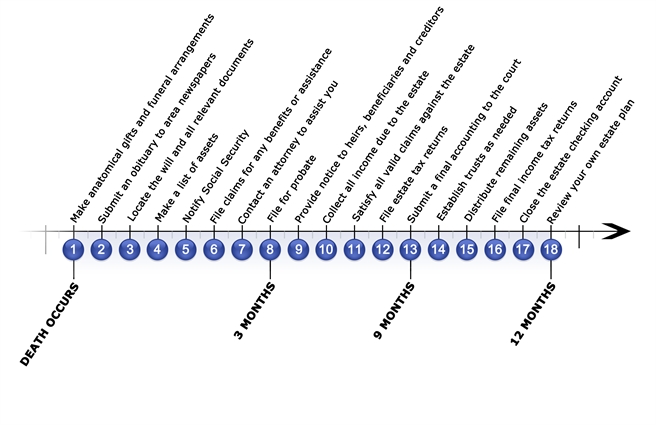
Loss of a Spouse
|
|
The Probate Process - In the event the decedent made no provision for anatomical gifts, many states allow you to make that decision. In most jurisdictions, the funeral director can obtain certified copies of the death certificate for you (you will need several copies).
- Word of mouth may not travel in time for the funeral.
- Locate the will, birth certificate, marriage certificate, Social Security card, and any other relevant documents.
- Note the location and value (you may need to retain an appraiser) of all real estate, insurance policies, jewelry, and other assets. Make sure assets are adequately insured.
- Inform the Social Security Administration to stop payments that were being made to the decedent. Inquire about survivor's benefits.
- Investigate the existence of any veteran's benefits, private pensions, or life insurance and make claims at this time.
- Contact an attorney to assist you. He or she can help you determine whether probate is needed.
- Petition the appropriate court for probate.
- Place a legal notice in the paper to notify unidentified heirs and creditors. Contact named beneficiaries and known creditors directly.
- For example, if the decedant owned investment property, rents will need to be collected.
- This includes expenses, debts, and bequests (paid out in that order). Court permission may be required before writing checks through the estate account--keep meticulous records.
- The federal estate tax return is due nine months after the date of death. State filing deadlines vary, so check with the appropriate state agency.
- This is necessary to close the probate proceedings and relinquish the executor's duties.
- Set up any trusts as outlined in the will.
- Distribute remaining assets to all beneficiaries.
- The federal income tax return is due on tax day (typically April 15) of the year following death. State filing deadlines vary, so check with your local tax office.
- Notify the bank to close the estate checking account.
- Review and update your own estate plan.
|
|
|
|
| Prepared by Broadridge Investor Communication Solutions, Inc. Copyright 2024. |
|